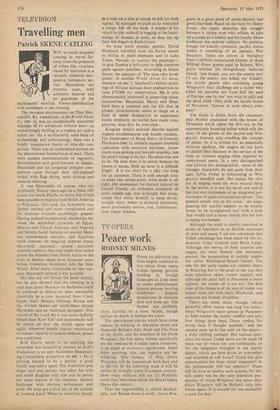TV OPERA
Peace work
RODNEY MILNES
Opera on television has been largely confined to live relays from opera houses (plump persons bawling in foreign languages in long shot) or studio performances (plump persons bawling indifferent English translations in medium shot and close-up). The former are probably more harmful by a short larynx, though neither do much to further the cause.
The opera-house operas which have come nearest to working in television terms are Benjamin Britten's Billy Budd and The Turn of the Screw, and the premiere of his Owen Wingrave, the first opera written specifically for the medium by a major opera composer, is an event of enormous significance. Apart from anything else, the logistics are be- wildering. This Sunday, 16 May, Owen Wingrave will be transmitted both here and in the us, In the following week it will be shown in virtually every European country. How many millions will see, it? Probably more than have been inside the Royal Opera House this century, Thus the responsibility is almost incalcul- able, and Britten bears it nobly. Owen Win-
grave is a great piece of music theatre, and good television. Based on the story by Henry James, the opera describes the struggle between a young man who refuses to take up a career as a soldier and his family whose traditions are entirely military. Its positive, though not exactly optimistic, pacifist theme makes it something of an operatic War Requiem. There are echoes in Myfanwy Piper's skilfully constructed libretto of those Wilfred Owen poems used by Britten; Win- grave reminds his thoughtlessly bellicose friend, 'you forget, you are the enemy too' ('I am the enemy you killed, my friend'); the family ghosts who constitute young Wingrave's final challenge are a father who killed his peaceful son (`and half the seed of Europe, one by one' you want to add) and the dead child—they walk the family house of Paramore, 'forever in each other's com- pany'.
The music is direct, from the character- istic rhythm associated with the house of Paramore which opens the first act, to the appropriately haunting ballad which tells the story of the ghosts in the second and Win- grave's bravura aria extolling the concept of peace. As it is written for an essentially intimate medium, the singers do not have to distort their features in the service of the lusty or virtuoso singing often required by opera-house opera. In a very distinguished cast (almost too distinguished : some of the younger characters do not quite look their age), Sylvia, Fisher is outstanding as Win- grave's dreadful aunt. She makes the very act of singing seem the most natural thing in the world; it is not the be-all and end-all but just one component of an integrated per- formance of quite extraordinary power. 'The general awaits you in his room,' she sings, greeting her pacifist nephew as he returns home `to be straightened out' with a look that would turn a lesser mortal like me into a raging warmonger.
Although the work is clearly conceived in terms of television in its flexible treatment of time and space, I am not convinced that fullest advantage has been taken by the co- directors Colin Graham and Brian Large. Although the moves of both cameras and singers are most fluently and intricately plotted, the presentation is entirely studio- (or rather Maltings-at-Snape) bound. The sets for the early scenes are realistic down to flickering fire in the grate in the way that even television opera cannot support, and although the great hall at Paramore is more stylised, the rooms off it are not. The first view of the house is of the sort of model one hoped went out with early Hitchcock, and exteriors are funked altogether.
There are some shots, though, whose powerful effect makes one long for more : when Wingrave's tutor arrives at Paramore to help resolve the family conflict and asks how things have been, Owen replies 'far worse than I thought possible,' and the camera pans up to the aunt on the stairs— a truly chilling moment. But various ques- tions are raised. Could more use be made of voice out of vision for aria/soliloquies, or for the unspoken thoughts at the family dinner, which are here given an echo-effect and mouthed in soft focus? Could this give opportunities for freer visual treatment? Is the presentation still too operatic? There will be time to resolve such queries, for this will surely not be the only television pro- duction of Owen Wingrave any more than Owen Wingrave will be Britten's only tele- vision opera. It is already far too successful a work for that.






































 Previous page
Previous page